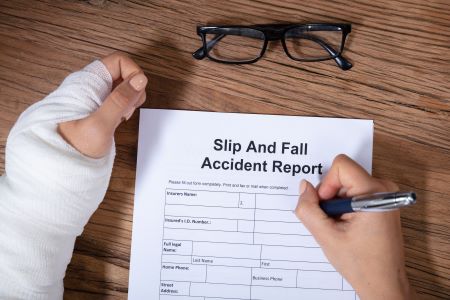
Often, when we fall, we fall over things that are hard to see. Perhaps they are hidden from view, or obscured. But other times we fall over things that are somewhat in the open, and things that we could have seen. If you do fall over something that you could have and should have seen, can you still sue for your injuries?
Suing for Open and Obvious Conditions
As a general rule, you cannot sue for falling over a condition that is plainly, blatantly open, obvious and observable. This is kind of common sense—technically, every step, curb, or parking bumper is out in the open, and landowners can’t be liable for everything.
But analyzing whether a condition is observable is sometimes not so easy. In fact, a condition can go from observable, to unobservable, pretty quickly.
For example, imagine a lump of ice cream on the floor. That may be pretty observable, so long as the floor underneath is a different color. But now, imagine that ice cream has melted, thus thinning it out. It has become “see-through” so the floor underneath is kind of “mixing” with the ice cream. Now, the ice cream is not so obvious.
Placement Matters
The placement of items may make them more or less open and obvious. For example, imagine those long, cement parking bumpers that often are at the end of parking spaces. Certainly, they are in the open, and you would expect them to be there, if you are walking across a parking lot. But if you put that same parking bumper right outside the store’s door, it now is not open and obvious.
The metal bottom prongs of a forklift may be open and obvious. But if those metal prongs of a forklift are gray, and the floor underneath it is gray, it may be hard to see that forklift arm, and it is not so obvious.
Attention Diversion
Stores often make efforts to divert our attention. They place large displays and signs advertising products or sales, in efforts to divert our eyes to what they want us to see. An item that is open and obvious on the floor may not be so obvious, if the store is trying to get us to look elsewhere.
Even if a dangerous condition is in the open, many courts have said that property owners still have a duty to warn people of open and obvious dangers, even if there is no legal duty to do anything to fix these conditions. Usually, signs warning of slippery floors, or other dangers, are used.
As you can see, whether something is open and obvious is not such an easy question, and in many cases, the exact circumstances of the store, the condition, and the fall, will dictate whether a victim can sue or not for a fall.
If you are injured in any kind of fall, Rosen Injury Law can help. Contact us today to speak with a skilled Fort Lauderdale personal injury lawyer.